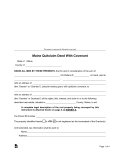Laws
- Signing – Title 33, § 203 – A notary public or officer of the court is required to witness the grantor’s signatures on a quit claim deed filed in the State of Maine.
- Recording – Like all deeds in Maine, this deed must be acknowledged by a notary and filed with the Registry of Deeds in the County where the property is located.
- Statute – Title 33, § 161
- Real Estate Transfer Tax (§ 4641) – Must be filed with an accompanying deed and can be completed online or with the printable form.
Quitclaim Covenants
Maine statutes authorize two different types of quitclaim deeds:
- a quitclaim deed with covenant
- a quitclaim deed without covenant
The quitclaim deed without covenant is closer to what is meant by “quitclaim” in most other states: the seller is only offering the interest that they have. A quitclaim deed with covenant, by contrast, means that the seller will defend the buyer against anyone making a claim to the property through the seller.[1]
The quitclaim deed with covenants, in this sense, resembles a general warranty deed, and as a result, may be more desirable in some situations. Those creating a quitclaim deed in Maine should think carefully about what they are offering and the language of the deed. A quitclaim deed without covenant will typically just use the “release all rights in the premises being conveyed” without mention of any warranty.[2]
Covenant Version
 Maine Quit Claim Deed With Covenant – A quit claim deed that provides the buyer limited protection against claims to the property
Maine Quit Claim Deed With Covenant – A quit claim deed that provides the buyer limited protection against claims to the property
Download: PDF
